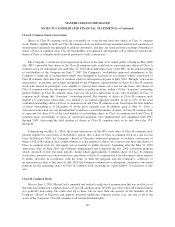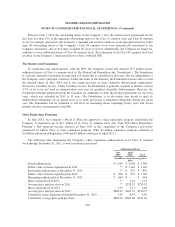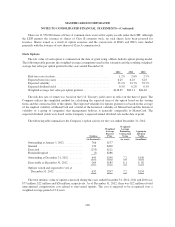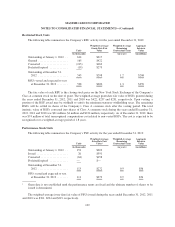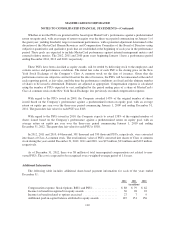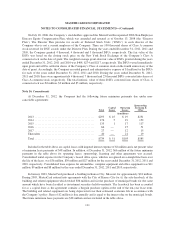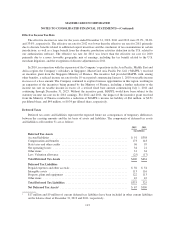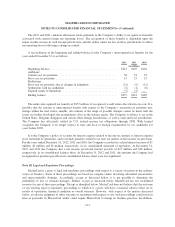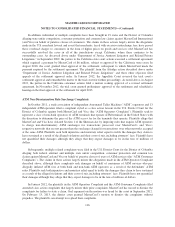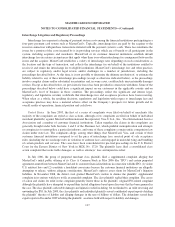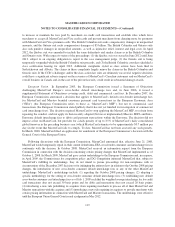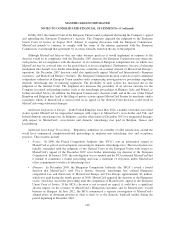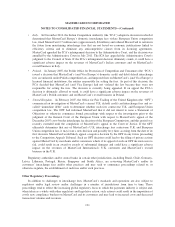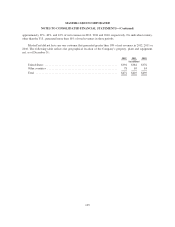MasterCard 2012 Annual Report Download - page 119
Download and view the complete annual report
Please find page 119 of the 2012 MasterCard annual report below. You can navigate through the pages in the report by either clicking on the pages listed below, or by using the keyword search tool below to find specific information within the annual report.MASTERCARD INCORPORATED
NOTES TO CONSOLIDATED FINANCIAL STATEMENTS—(Continued)
an adverse outcome in a regulatory proceeding could lead to the filing of civil damage claims and possibly result
in damage awards in amounts that could be significant. Any of these events could have a material adverse effect
on MasterCard’s results of operations, financial condition and overall business.
Department of Justice Antitrust Litigation and Related Private Litigations
In October 1998, the U.S. Department of Justice (“DOJ”) filed suit against MasterCard International, Visa
U.S.A., Inc. and Visa International Corp. in the U.S. District Court for the Southern District of New York
alleging that both MasterCard’s and Visa’s governance structure and policies violated U.S. federal antitrust laws.
The DOJ challenged (1) “dual governance”, where a financial institution has a representative on the Board of
Directors of MasterCard or Visa while a portion of its card portfolio is issued under the brand of the other
association, and (2) both MasterCard’s Competitive Programs Policy (“CPP”) and a Visa bylaw provision that
prohibited financial institutions participating in the respective associations from issuing competing proprietary
payment cards (such as American Express or Discover). In October 2001, the judge issued an opinion upholding
the legality and pro-competitive nature of dual governance. However, the judge also held that MasterCard’s CPP
and the Visa bylaw constituted unlawful restraints of trade under the federal antitrust laws. The judge
subsequently issued a final judgment that ordered MasterCard to repeal the CPP and enjoined MasterCard from
enacting or enforcing any bylaw, rule, policy or practice that prohibits its issuers from issuing general purpose
credit or debit cards in the United States on any other general purpose card network.
In April 2005, a complaint was filed in California state court on behalf of a putative class of consumers
under California unfair competition law (Section 17200) and the Cartwright Act (the “Attridge action”). The
claims in this action seek to piggyback on the portion of the DOJ antitrust litigation discussed above with regard
to the District Court’s findings concerning MasterCard’s CPP and Visa’s related bylaw. The Court granted the
defendants’ motion to dismiss the plaintiffs’ Cartwright Act claims but denied the defendants’ motion to dismiss
the plaintiffs’ Section 17200 unfair competition claims. The parties have proceeded with discovery. In September
2009, MasterCard executed a settlement agreement that is subject to court approval in the separate California
consumer litigations (see “U.S. Merchant and Consumer Litigations”). The agreement includes a release that the
parties believe encompasses the claims asserted in the Attridge action. In August 2010, the Court in the
California consumer actions granted final approval to the settlement. The plaintiff from the Attridge action and
three other objectors filed appeals of the settlement approval. In January 2012, the Appellate Court reversed the
trial court’s settlement approval and remanded the matter to the trial court for further proceedings. In August
2012, the parties in the California consumer actions filed a motion seeking approval of a revised settlement
agreement. In November 2012, the trial court granted preliminary approval of the settlement and scheduled a
hearing on the final approval of the settlement for April 2013.
U.S. Merchant and Consumer Litigations
Commencing in October 1996, several class action suits were brought by a number of U.S. merchants
against MasterCard International and Visa U.S.A., Inc. challenging certain aspects of the payment card industry
under U.S. federal antitrust law. The plaintiffs claimed that MasterCard’s “Honor All Cards” rule (and a similar
Visa rule), which required merchants who accept MasterCard cards to accept for payment every validly presented
MasterCard card, constituted an illegal tying arrangement in violation of Section 1 of the Sherman Act. In June
2003, MasterCard International signed a settlement agreement to settle the claims brought by the plaintiffs in this
matter, which the Court approved in December 2003. Pursuant to the settlement, MasterCard agreed, among
other things, to create two separate “Honor All Cards” rules in the United States—one for debit cards and one for
credit cards.
115


